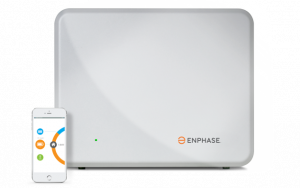If you’re considering installing a solar battery, then this is your starting point. In this article, we take you through the basics, including what a solar battery is, how it works, where to buy one, how much they cost, and how to get the best bang for your buck.
 A solar battery acts as an energy storage unit, storing electricity generated by solar panels to use after sunset. Ordinarily when electricity is produced by solar panels that isn’t used immediately by a household, it is diverted to the energy grid, where the customer receives what’s known as a ‘feed-in tariff’ – a small rebate on their energy bill.
A solar battery acts as an energy storage unit, storing electricity generated by solar panels to use after sunset. Ordinarily when electricity is produced by solar panels that isn’t used immediately by a household, it is diverted to the energy grid, where the customer receives what’s known as a ‘feed-in tariff’ – a small rebate on their energy bill.
Solar rebates will typically amount to 5c to 20c per kilowatt hour (kWh) of solar power exported to the grid. Since solar panels generate the most electricity through the day when nobody is home to use it, the majority of solar power is exported to the grid.
Having a solar battery can help customers save money by using power generated from their own solar system, rather than relying on the grid. This is made possible because the price of electricity from the grid (20-35c/kWh) usually exceeds the standard feed-in tariff rate they would receive for exporting power instead of consuming it (5-20c/kWh). Solar batteries also allow customers to take advantage of time of use feed-in tariffs and save even more on power. This way, households can export power in peak demand periods to receive the highest feed-in tariff.
Otherwise known as an ‘energy storage unit’, a solar battery works by storing the excess electricity generated from a household’s solar system during the day. The surplus of energy that is stored by the battery can then be used later at night during peak usage periods when electricity rates tend to be more expensive.
A solar battery can be connected to an existing photovoltaic (PV) system or installed with a new solar panel system. Some solar panel installers may even offer you a solar and battery system install with no upfront costs. Most solar batteries will vary in size from 1kWh to 15kWh, depending on the house or small business’s energy usage needs.
The exact number of batteries needed for a solar system will vary depending on the amount of electricity used by the household and what time this usage occurs. If you wish to power your entire house on solar energy or you use a large portion of electricity in the evening, you’ll likely need more batteries than the average household in order to fulfil your needs. A good rule of thumb however, is to have a least double what your system is capable of. For example, if you have a 5kW solar system, you’ll probably need at least a 10kW battery for sufficient battery storage.
You’ve probably heard of the Tesla Powerwall, but there are loads of other options and solar battery retailers on the market, including the likes of Redflow and Aquion, who have developed unique technologies to deliver what they consider to be a superior battery. Keep in mind solar batteries are still developing to this day, so you can expect more options to choose from in the future.
Plus, not all batteries are the same. In fact, there are several types, each with their own pros and cons. The most common types of solar battery are Lithium-ion, Flow, Nickel-Iron and Lead Acid, however these may change as technology advances.
Lithium-ion batteries are the most common type of battery on the market, thanks to popular brands like Tesla Powerwall, LG Chem RESU and SonnenBatterie. Lithium-ion batteries are durable and can be discharged heavily, however they can degrade over time.